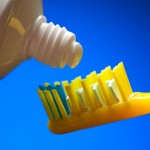
Cochrane reviews have clearly documented the anti-caries benefits of fluoridated toothpastes (Marhino et al 2003, Walsh et al 2010). New agents to improve caries prevention would assist efforts to reduce the impact of caries, particularly on children. The aim of this study was to investigate the efficacy of two dentifrices containing 1.5% arginine, an insoluble calcium compound and 1,450 ppm F in preventing caries lesion cavitation compared to a dentifrice with 1,450 ppm F alone.
Children in elementary or middle school who had at least four permanent molars fully erupted and at least one permanent central and/or lateral incisor erupted were recruited. Children were randomised to receive either one of the three pastes. Group 1 contained 1.5% arginine, 1,450 ppm F, di-calcium phosphate, Group 2contained1.5% arginine, 1,450 ppm F, calcium carbonate; Group 3, 1,450 ppm F. Participants were provided with tubes of their assigned dentifrice and a manual toothbrush and instructed to brush their teeth twice daily, in the morning and evening, at home. Clinical examinations were conducted by 3 trained and calibrated examiners in school classrooms, using portable dental surgery equipment, at baseline and at 1 and 2 years. Decayed, missing and filled teeth (DMFT) and surfaces (DMFS) scores were calculated for each participant and then the mean DMFT and DMFS scores were calculated for each dentifrice group.
- Of the 8,989 children consented, 6,090 met the inclusion criteria, with 6000 being assigned to one of the 3 groups, 2000 per group. The mean age at baseline was 8.6 years.
- At 12 months, 447 were lost to follow up (group 1, 145; group 2,139; group 3, 163)
- At 24 months, 497 were lost to follow up (group 1, 176; group 2,168; group 3, 153)
- At two years incremental-
- DMFT scores were 0.49 ± 1.00, 0.51 ± 1.01 and 0.62 ± 1.03 in groups 1,2 and 3 respectively
- DMFS scores were 0.76 ± 1.68, 0.76 ± 1.59 and 0.91 ± 1.67 in groups 1,2 and 3 respectively
- Relative to the fluoride control dentifrice, both group 1 and group 2 exhibited statistically significant reductions in incremental DMFS scores after 2 years of product use (16.5% and 16.5%, respectively)
The authors concluded:-
The results of this pivotal 2-year caries clinical study support the conclusion that dentifrices containing 1.5% arginine, an insoluble calcium compound and 1,450 ppm F as sodium monofluorophosphate provide significantly greater protection against caries lesion cavitation, in a low to moderate caries risk population than dentifrices containing 1,450 ppm F alone.
Note:- This research was funded by Colgate-Palmolive. Drs. Kraivaphan, Amornchat, Triratana and Boneta and Mr. Mateo were funded by Colgate-Palmolive to conduct this study. Drs. Ellwood, Cummins, DeVizio and Zhang are employees of Colgate-Palmolive.
Links
Kraivaphan P, Amornchat C, Triratana T, Mateo LR, Ellwood R, Cummins D, DeVizio W, Zhang YP. Two-year caries clinical study of the efficacy of novel dentifrices containing 1.5% arginine, an insoluble calcium compound and 1,450 ppm fluoride. Caries Res. 2013;47(6):582-90. doi: 10.1159/000353183. Epub 2013 Aug 28. PubMed PMID: 23988908.
Marinho VCC, Higgins JPT, Logan S, Sheiham A. Fluoride toothpastes for preventing dental caries in children and adolescents. Cochrane Database of Systematic Reviews 2003, Issue 1. Art. No.: CD002278. DOI: 10.1002/14651858.CD002278.
Walsh T, Worthington HV, Glenny AM, Appelbe P, Marinho VCC, Shi X. Fluoride toothpastes of different concentrations for preventing dental caries in children and adolescents. Cochrane Database of Systematic Reviews 2010, Issue 1. Art. No.: CD007868. DOI: 10.1002/14651858.CD007868.pub2.

[…] Dental Elf – 7th Feb 2014 -Study suggests that dentifrices containing 1.5% arginine, an insolu… […]